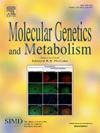Identification of a novel RBCK1 splice site donor variant in Basset Hounds with glycogen storage disease myopathy
IF 3.5
2区 生物学
Q2 ENDOCRINOLOGY & METABOLISM
引用次数: 0
Abstract
Glycogen storage diseases (GSDs) are rare, typically inherited, disorders caused by various defects in glycogen metabolism enzymes, generally resulting in the accumulation of glycogen in several tissues. Recently, two young adult Basset Hound (BH) littermates were diagnosed with GSD via postmortem histopathology, with excess glycogen manifesting in both cardiac and smooth muscle. Using whole genome sequencing, a homozygous splice site donor variant was identified in exon 8 of RBCK1, a gene which encodes an E3 ubiquitin ligase, in both littermates, suggesting an autosomal recessive mode of inheritance. The presumptive loss of the splice site donor is predicted to result in premature termination in the mid-domain of the protein. Screening for the variant in related (n = 21) and unrelated (n = 124) BHs identified one additional affected littermate and nine familial heterozygous carriers. No variant alleles were present in the unrelated BH population, establishing the novelty of the identified mutation. RBCK1 variants have previously been associated with polyglucosan body myopathy type 1 (PGBM1), a type of GSD characterized by skeletal muscle myopathy, cardiomyopathy, and polyglucosan accumulation in humans. To date, no reported variants in RBCK1 have been identified in dogs or other large animals associated with GSD, making this the first naturally occurring large animal model of PGBM1 due to an RBCK1 defect.
一种新的RBCK1剪接位点供体变异在患有糖原储存性肌病的巴吉特猎犬中的鉴定
糖原储存病(GSDs)是一种罕见的、典型的遗传性疾病,由糖原代谢酶的各种缺陷引起,通常导致糖原在几个组织中积累。最近,两只年轻的成年巴吉特猎犬(BH)幼崽通过死后组织病理学诊断为GSD,心脏和平滑肌均表现出过量的糖原。利用全基因组测序,在两个幼鼠的RBCK1基因(编码E3泛素连接酶)的第8外显子上发现了一个纯合剪接位点供体变异,表明这是一种常染色体隐性遗传模式。预计剪接位点供体的推定损失将导致蛋白质中部结构域的过早终止。在相关BHs (n = 21)和非相关BHs (n = 124)中进行变异筛查,发现了另外1名受影响的同胎和9名家族杂合携带者。在不相关的BH人群中没有变异等位基因,确定了所鉴定突变的新颖性。RBCK1变异先前与1型多葡聚糖体肌病(PGBM1)有关,PGBM1是一种以人类骨骼肌肌病、心肌病和多葡聚糖积累为特征的GSD。迄今为止,还没有报道在狗或其他与GSD相关的大型动物中发现RBCK1变异,这使得这是第一个由于RBCK1缺陷而自然发生的PGBM1大型动物模型。
本文章由计算机程序翻译,如有差异,请以英文原文为准。
求助全文
约1分钟内获得全文
求助全文
来源期刊

Molecular genetics and metabolism
生物-生化与分子生物学
CiteScore
5.90
自引率
7.90%
发文量
621
审稿时长
34 days
期刊介绍:
Molecular Genetics and Metabolism contributes to the understanding of the metabolic and molecular basis of disease. This peer reviewed journal publishes articles describing investigations that use the tools of biochemical genetics and molecular genetics for studies of normal and disease states in humans and animal models.
 求助内容:
求助内容: 应助结果提醒方式:
应助结果提醒方式:


